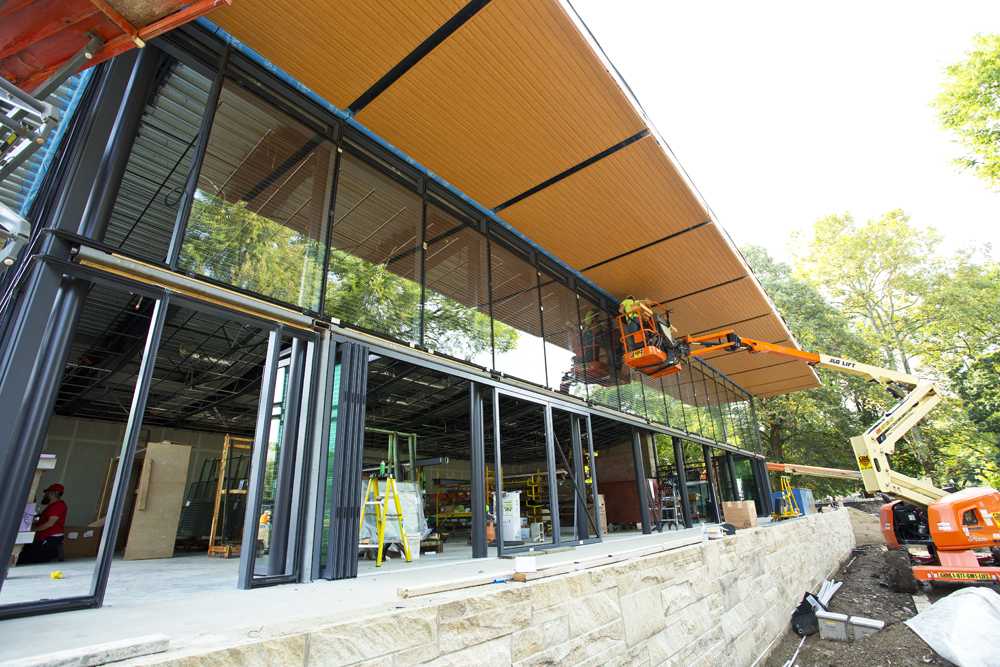Energy-Efficient, Bird-Safe Glass Installed at National Aviary’s New Garden Room
Walker Glass and Vitro Glass technologies combine to protect venue’s local bird habitat
 Photography by Jim Cunningham
Photography by Jim Cunningham
PITTSBURGH, Sept. 24, 2020 – The National Aviary in Pittsburgh recently completed the installation of glass windows and doors at The Garden Room, a new glass-enclosed venue for weddings, special events, and educational programs that also will serve as a showcase for energy-efficient, bird-safe glass.
Featuring expansive floor-to-ceiling windows fabricated with AviProtek® bird-friendly glass by Walker Glass and Solarban® solar control, low-e coatings by Vitro Architectural Glass, The Garden Room is designed to protect the both the environment and the local bird population that inhabits the surrounding city park.
“The National Aviary works hard every day to provide the best possible care for the birds who live with us, as well as those in the wild, through field conservation programs and education,” said Cheryl Tracy, executive director of the National Aviary. “As we made plans for The Garden Room, it was important to us to practice these principles by selecting materials that would help keep the wild birds in our neighboring park safe.”
Designed by an architectural team led by Pittsburgh-based Tony Pitassi of Perfido Weiskopf Wagstaff + Goettel, The Garden Room features about 2,700 square feet of glass. Working as a group, Tracy, the architect and the design team consulted with experts from Walker Glass, Vitro Glass and the American Bird Conservancy to consider a range of glass options to reduce bird collisions while enhancing the bright, open aesthetic of the new space.
“The National Aviary's bird experts were integral to designing a façade that meets bird-safe standards,” said Pitassi. “Given the desire for transparency in the building envelope and the need to complement the site’s natural environment, maximizing the use of glass was an imperative.”
AviProtek® glass by Walker Glass, a pioneer in bird-safe glass design, helps birds to “see” expanses of glass by meeting an industry standard known as the “two by four” rule, which dictates that visual elements in a bird-safe glass pattern appear at least two inches apart horizontally or four inches apart vertically. The National Aviary’s design team selected a horizontal-stripe pattern for The Garden Room.
The Solarban® solar control, low-e coatings specified with AviProtek® glass will enable the National Aviary to operate more efficiently by blocking more than 70% of the sun’s heat energy while transmitting high levels of daylight to reduce artificial lighting costs. The result will be a venue that is brighter, more comfortable and better for the environment because it consumes less energy.
For more information about Solarban® glass and Vitro Glass’s full line of architectural glasses, visit www.vitroglazings.com or call 1-855-VTRO-GLS (887-6457). For more information about AviProtek® E Bird-Friendly glass, visit www.walkerglass.com or call 1-888-320-3030.
Editor’s note: High-resolution photography is available upon request.
Solarban® is a registered trademark owned by Vitro.
Avi-Protek® is a registered trademarked owned by Walker Glass.
About Vitro Architectural Glass
Vitro Architectural Glass is the largest glass producer in the Western Hemisphere, manufacturing a range of industry-leading, energy-efficient, high-performance products such as Solarban®, Sungate® and Starphire Ultra-Clear® glasses. Committed to continually raising the industry standard for sustainability, Vitro was the first U.S. glass manufacturer to have its complete collection of architectural glass products earn Cradle to Cradle Certified® status and the first North American manufacturer to publish third-party verified Environmental Product Declarations (EPDs) for flat glass and processed glass products. Additionally, as of April 2024, all Vitro architectural glass products meet the Top 20% Low Embodied Carbon (LEC) material Global Warming Potential (GWP) threshold the U.S. General Services Administration (GSA) established pursuant to the Inflation Reduction Act of 2022 and related guidance from the U.S. Environmental Protection Agency. Vitro operates seven glass production facilities across North America, four residential glass fabrication plants in Canada and one of the world’s largest glass research and development facilities in Pittsburgh, Pennsylvania. For more information, please visit VitroGlazings.com.

Media Contact:
Robert J. Struble
Vitro Architectural Glass
412-820-8138
rstruble@vitro.com
vitroglazings.com
